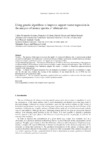Using Genetic Algorithms to Improve Support Vector Regression in the Analysis of Atomic Spectra of Lubricant Oils

Use este enlace para citar
http://hdl.handle.net/2183/17500Coleccións
- GI-RNASA - Artigos [195]
- INIBIC-RNASA-IMEDIR - Artigos [46]
Metadatos
Mostrar o rexistro completo do ítemTítulo
Using Genetic Algorithms to Improve Support Vector Regression in the Analysis of Atomic Spectra of Lubricant OilsAutor(es)
Data
2016-06Cita bibliográfica
Fernández-Lozano C, Cedrón F, Rivero D, Dorado J. Andrade-Garda JM, Pazos A, Gestal M. Using genetic algorithms to improve support vector regression in the analysis of atomic spectra of lubricant oils. Engineering Computations. 2016;33(4):995-1005
Resumo
[Abstract] Purpose
– The purpose of this paper is to assess the quality of commercial lubricant oils. A spectroscopic method was used in combination with multivariate regression techniques (ordinary multivariate multiple regression, principal components analysis, partial least squares, and support vector regression (SVR)).
Design/methodology/approach
– The rationale behind the use of SVR was the fuzzy characteristics of the signal and its inherent ability to find nonlinear, global solutions in highly complex dimensional input spaces. Thus, SVR allows extracting useful information from calibration samples that makes it possible to characterize physical-chemical properties of the lubricant oils.
Findings
– A dataset of 42 spectra measured from oil standards was studied to assess the concentration of copper into the oils and, thus, evaluate the wearing of the machinery. It was found that the use of SVR was very advantageous to get a regression model.
Originality/value
– The use of genetic algorithms coupled to SVR was considered in order to reduce the time needed to find the optimal parameters required to get a suitable prediction model.
Palabras chave
Genetic algorithms
Lubricant oils
Support
Vector regression
Lubricant oils
Support
Vector regression





